小学一般过去式句型转换1
一般过去时 六年级英语知识点

一般过去时(小学)一、定义1.表示过去某个时间发生的动作或存在的状态。
如:She ate three apples yesterday. 昨天她吃了三个苹果。
I got up at 6:30 yesterday. 我昨天6:30起床。
My father was very busy last week.我父亲上周很忙。
2.表示过去经常或过去反复发生的动作(也可与often,always等频率副词连用)。
如:He always got up very early when he was young.年轻的时候,他每天总是起得很早。
二、谓语形式:动词的过去式(1)She was a student two years ago. 两年前她是一个学生。
(这件事情已经过去了,所以be动词is要用过去式was)(2)they were students two years ago. 两年前他们/她们是学生。
(这件事情已经过去了,所以be动词are要用过去式were)(3) Ann washed her clothes last night. 安昨晚洗了她的衣服。
(这件事情已经过去了,所以动词wash要用过去式washed)(4) I did my homework promptly. 我及时地完成了作业。
(这件事情已经过去了,所以动词do要用过去式did)三、句子结构:(a) be 动词的过去式句型: (b)动词过去式句型:(a) be 动词的过去式句型:1.肯定句:主语+be 动词(was , were)+其他,如:She was a student two years ago. 两年前她是一个学生。
2.否定句:主语+be not(was not, were not)+其他,如:She was not a student two years ago. 两年前她不是一个学生。
3.一般疑问句:Be动词(Was/Were)+主语+其他?肯定回答为“Yes,主语+was/were”,否定回答为“No,主语+wasn’t/weren’t”。
一般过去时的几种句型

一般过去时的几种句型The final revision was on November 23, 2020人称代词用来代替表示人或事物的名词,以便不再重复使用名词。
1)人称代词的主格在句子中作主语用法举例:1.My name is Millie. I live in Beijing. ( I代自己, Millie )2. Sandy, do you know where Mr Wu is ( you代Sandy )3. Simon loves football. He is a member of the football team.4. Millie loves Eddie. She looks after him every day. (she 代 Millie)5. This book is very interesting. It is about cartoons. (it 代this book)6. I am Daniel and this is Amy. We are in Class 1, Grade7. (we 代替 Amy and I)2)人称代词的宾格在句子中作宾语(放在动词后面或者介词后面)me the answer, please.(动词后面)’s go.(=let us go) (动词后面)3. Look at him. He is funny! (介词后面)物主代词的定义:物主代词实际上是人称代词的所有格形式。
物主代词可以分为形容词性和名词性两种。
形容词性物主代词一定要后接名词(如:This is my book. 这是我的书。
),名词性物主代词可以独立使用,无需后接名词(如:This book is mine. 这本书是我的。
)。
3) 形容词性物主代词一般位于名词前,用作定语,限定该名词的意义This is my book.4) 名词性物主代词的句法功能a. 作主语,例如:May I use your pen Mine is broken.(mine=my pen)我可以用一用你的钢笔吗我的坏了。
一般过去时态句型转换方法归纳
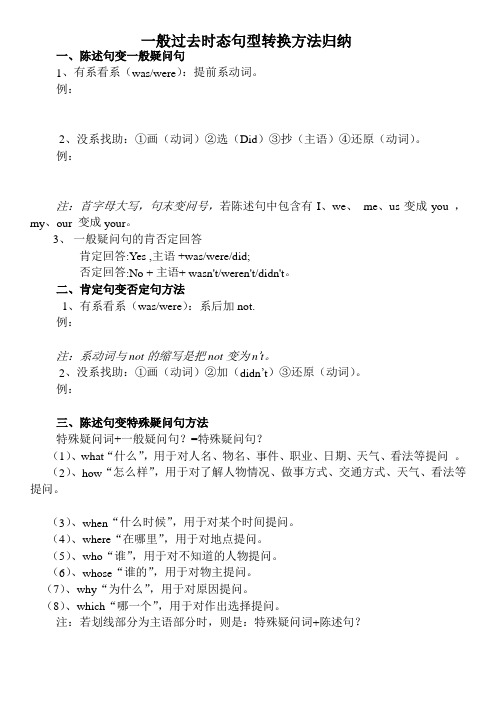
一般过去时态句型转换方法归纳
一、陈述句变一般疑问句
1、有系看系(was/were):提前系动词。
例:
2、没系找助:①画(动词)②选(Did)③抄(主语)④还原(动词)。
例:
注:首字母大写,句末变问号,若陈述句中包含有I、we、me、us变成you ,my、our 变成your。
3、一般疑问句的肯否定回答
肯定回答:Yes ,主语 +was/were/did;
否定回答:No + 主语+ wasn't/weren't/didn't。
二、肯定句变否定句方法
1、有系看系(was/were):系后加not.
例:
注:系动词与not的缩写是把not变为n’t。
2、没系找助:①画(动词)②加(didn’t)③还原(动词)。
例:
三、陈述句变特殊疑问句方法
特殊疑问词+一般疑问句?=特殊疑问句?
(1)、what“什么”,用于对人名、物名、事件、职业、日期、天气、看法等提问。
(2)、how“怎么样”,用于对了解人物情况、做事方式、交通方式、天气、看法等提问。
(3)、when“什么时候”,用于对某个时间提问。
(4)、where“在哪里”,用于对地点提问。
(5)、who“谁”,用于对不知道的人物提问。
(6)、whose“谁的”,用于对物主提问。
(7)、why“为什么”,用于对原因提问。
(8)、which“哪一个”,用于对作出选择提问。
注:若划线部分为主语部分时,则是:特殊疑问词+陈述句?。
一般过去时的用法和结构
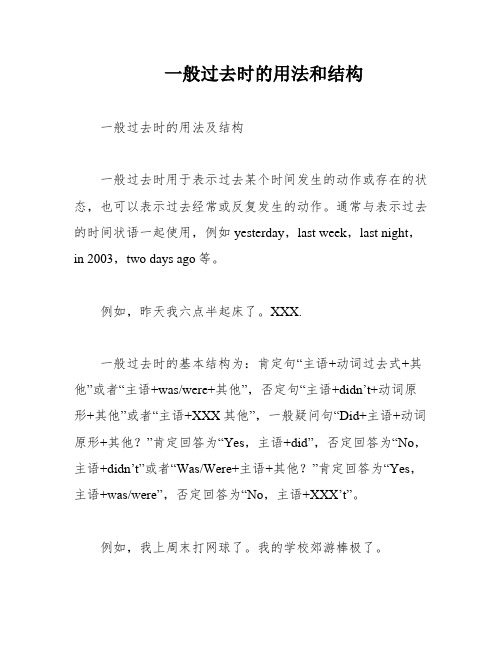
一般过去时的用法和结构一般过去时的用法及结构一般过去时用于表示过去某个时间发生的动作或存在的状态,也可以表示过去经常或反复发生的动作。
通常与表示过去的时间状语一起使用,例如yesterday,last week,last night,in 2003,two days ago等。
例如,昨天我六点半起床了。
XXX.一般过去时的基本结构为:肯定句“主语+动词过去式+其他”或者“主语+was/were+其他”,否定句“主语+didn’t+动词原形+其他”或者“主语+XXX其他”,一般疑问句“Did+主语+动词原形+其他?”肯定回答为“Yes,主语+did”,否定回答为“No,主语+didn’t”或者“Was/Were+主语+其他?”肯定回答为“Yes,主语+was/were”,否定回答为“No,主语+XXX’t”。
例如,我上周末打网球了。
我的学校郊游棒极了。
这个女孩昨天下午没玩电子游戏。
上星期五老XXX不高兴。
特殊疑问句的结构为:特殊疑问词+一般疑问句(顺序)?例如,XXX上周末干什么了?他去看了他的祖父母。
你昨天在哪儿?我在家里。
为了帮助记忆实义动词一般过去时的用法和结构,我们可以使用以下歌诀:“动词一般过去时,表示过去发生事。
谓语动词过去式,过去时间作标志。
否定形式很简单,主语之后加didn't。
谓语动词要还原。
疑问构成有规则,主语前面加did。
”过去式的构成有两种方式:be动词和实义动词。
系动词be的过去式有两种形式:was和were。
其中,was是am和is的过去式,were是are的过去式。
实义动词过去式的构成有以下几种规则:1.一般在动词末尾加-ed,例如walk→walked,play→played;2.以不发音e结尾的动词末尾只加-d,例如love→loved,decide→decided;3.以“辅音字母+y”结尾的动词,先将y变为i,再加-ed,例如study→studied,carry→carried;4.末尾只有一个辅音字母的重读闭音节,先双写该辅音字母,再加-ed,→ped,plan→planned。
小学生如何准确使用一般过去时

小学生如何准确使用一般过去时
一般过去时是英语语法中的一个基本时态,用于表示过去发生的动作、事件或状态,也是英语考试常考的内容之一。
那么小学生如何准确使用一般过去时呢?以下是几点建议。
了解动词过去式
使用一般过去时需要用到动词的过去式,因此小学生需要首先掌握常见动词的过去式。
例如:
- play → played
- eat → ate
- watch → watched
- study → studied
- dance → danced
当然还有不规则动词的过去式,例如:
- be → was/were
- have → had
- go → went
- do → did
- see → saw
小学生可以通过课本、练册等工具研究和记忆这些动词的过去式。
切换思维方式
使用一般过去时需要将思维模式从现在转变为过去。
小学生可以通过以下方式帮助自己切换思维:
- 听老师或其他同学用过去时叙述一些事件或故事
- 阅读课外书籍并用过去时复述故事情节
- 练默写过去时的句子和短文
这样可以帮助小学生熟悉和适应使用一般过去时。
多练
练是掌握任何技能的关键,小学生需要通过大量阅读和写作练来巩固和加深对一般过去时的理解和掌握。
建议小学生可以完成以下练:
- 阅读一些简单的故事或文章,并用过去时复述
- 完成练册中的一般过去时练题
- 写一篇自己的日记,使用一般过去时叙述过去发生的事情
以上是几点帮助小学生准确使用一般过去时的建议。
希望对小学生们的英语学习有所帮助!。
小升初语法专项-一般过去时(通用版,含答案)
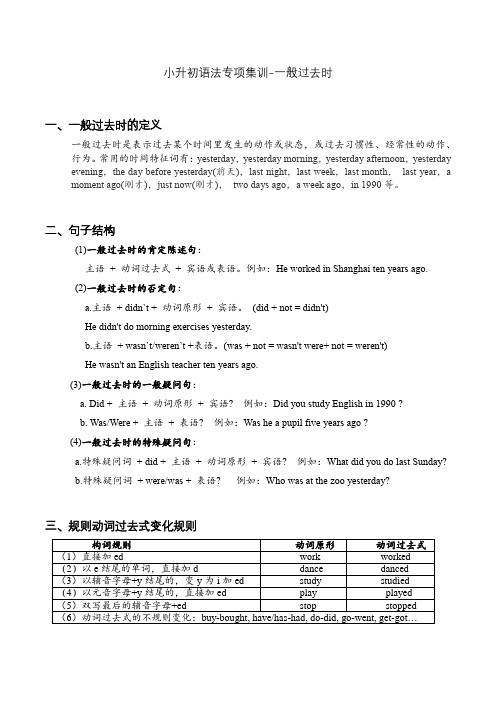
小升初语法专项集训-一般过去时一、一般过去时的定义一般过去时是表示过去某个时间里发生的动作或状态,或过去习惯性、经常性的动作、行为。
常用的时间特征词有:yesterday,yesterday morning,yesterday afternoon,yesterday evening,the day before yesterday(前天),last night,last week,last month,last year,a moment ago(刚才),just now(刚才),two days ago,a week ago,in 1990等。
二、句子结构(1)一般过去时的肯定陈述句:主语+ 动词过去式+ 宾语或表语。
例如:He worked in Shanghai ten years ago.(2)一般过去时的否定句:a.主语+ didn`t + 动词原形+ 宾语。
(did + not = didn't)He didn't do morning exercises yesterday.b.主语+ wasn`t/weren`t +表语。
(was + not = wasn't were+ not = weren't)He wasn't an English teacher ten years ago.(3)一般过去时的一般疑问句:a. Did + 主语+ 动词原形+ 宾语? 例如:Did you study English in 1990 ?b. Was/Were + 主语+ 表语? 例如:Was he a pupil five years ago ?(4)一般过去时的特殊疑问句:a.特殊疑问词+ did + 主语+ 动词原形+ 宾语? 例如:What did you do last Sunday?b.特殊疑问词+ were/was + 表语? 例如:Who was at the zoo yesterday?三、规则动词过去式变化规则一、写出下列单词的过去式。
一般过去时
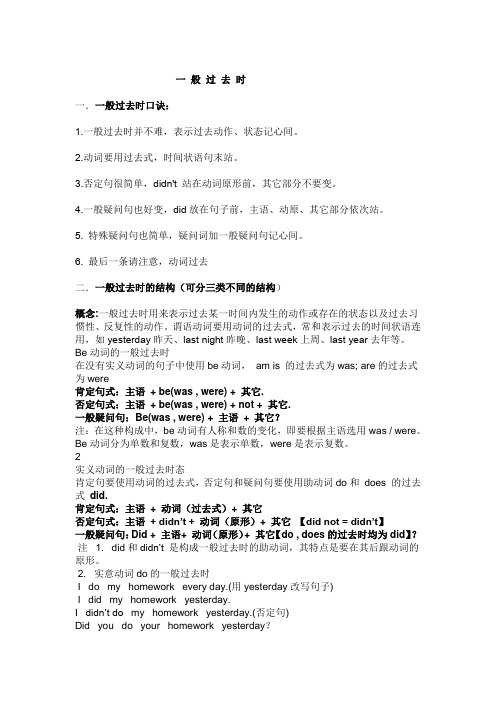
一般过去时一.一般过去时口诀:1.一般过去时并不难,表示过去动作、状态记心间。
2.动词要用过去式,时间状语句末站。
3.否定句很简单,didn't 站在动词原形前,其它部分不要变。
4.一般疑问句也好变,did放在句子前,主语、动原、其它部分依次站。
5. 特殊疑问句也简单,疑问词加一般疑问句记心间。
6. 最后一条请注意,动词过去二.一般过去时的结构(可分三类不同的结构)概念:一般过去时用来表示过去某一时间内发生的动作或存在的状态以及过去习惯性、反复性的动作。
谓语动词要用动词的过去式,常和表示过去的时间状语连用,如yesterday昨天、last night昨晚、last week上周、last year去年等。
Be动词的一般过去时在没有实义动词的句子中使用be动词,am is 的过去式为was; are的过去式为were肯定句式:主语+ be(was , were) + 其它.否定句式:主语+ be(was , were) + not + 其它.一般疑问句:Be(was , were) + 主语+ 其它?注:在这种构成中,be动词有人称和数的变化,即要根据主语选用was / were。
Be动词分为单数和复数,was是表示单数,were是表示复数。
2实义动词的一般过去时态肯定句要使用动词的过去式,否定句和疑问句要使用助动词do和does 的过去式did.肯定句式:主语+ 动词(过去式)+ 其它否定句式:主语+ didn’t + 动词(原形)+ 其它【did not = didn’t】一般疑问句:Did + 主语+ 动词(原形)+ 其它【do , does的过去时均为did】?注 1. did和didn’t 是构成一般过去时的助动词,其特点是要在其后跟动词的原形。
2. 实意动词do的一般过去时I do my homework every day.(用yesterday改写句子)I did my homework yesterday.I didn’t do my homework yesterday.(否定句)Did you do your homework yesterday?Yes ,I did. /No, I didn’t.(一般疑问句)3情态动词的一般过去时态情态动词的过去式:can→could , may→might , must→must ,will-would,should-should。
一般过去时练习 句型转换
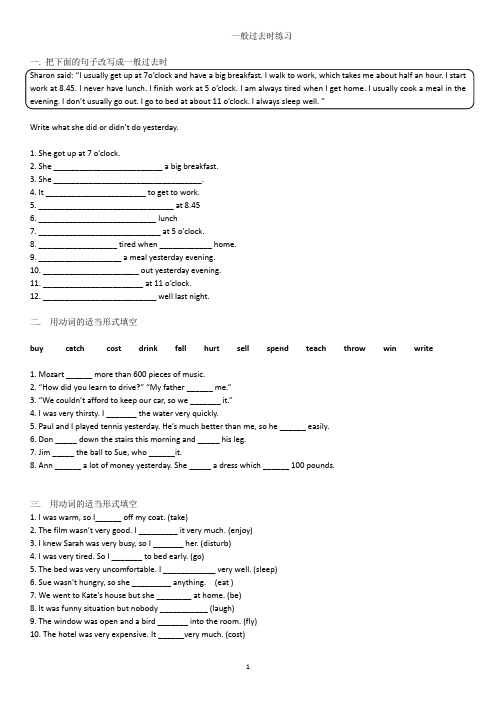
一般过去时练习一. 把下面的句子改写成一般过去时Sharon said: “I usually get up at 7o’clock and have a big breakfast. I walk to work, which takes me about half an hour. I start work at 8.45. I never have lunch. I finish work at 5 o’clock. I am always tired when I get home. I usually cook a meal in the evening. I don’t usually go out. I go to bed at about 11 o’clock. I always sleep well. ”Write what she did or didn’t do yesterday.1. She got up at 7 o’clock.2. She _________________________ a big breakfast.3. She __________________________________.4. It _______________________ to get to work.5. _______________________________ at 8.456. ___________________________ lunch7. ____________________________ at 5 o’clock.8. __________________ tired when ____________ home.9. ___________________ a meal yesterday evening.10. ______________________ out yesterday evening.11. _______________________ at 11 o’clock.12. __________________________ well last night.二. 用动词的适当形式填空buy catch cost drink fall hurt sell spend teach throw win write1. Mozart ______ more than 600 pieces of music.2. “How did you learn to drive?”“My father ______ me.”3. “We couldn’t afford to keep our car, so we _______ it.”4. I was very thirsty. I _______ the water very quickly.5. Paul and I played tennis yesterday. He’s much better than me, so he ______ easily.6. Don _____ down the stairs this morning and _____ his leg.7. Jim _____ the ball to Sue, who ______it.8. Ann ______ a lot of money yesterday. She _____ a dress which ______ 100 pounds.三. 用动词的适当形式填空1. I was warm, so I______ off my coat. (take)2. The film was n’t very good. I _________ it very much. (enjoy)3. I knew Sarah was very busy, so I _______ her. (disturb)4. I was very tired. So I _______ to bed early. (go)5. The bed was very uncomfortable. I ____________ very well. (sleep)6. Sue wasn’t hungry, so she _________ anything. (eat )7. We went to Kate’s house but she ________ at home. (be)8. It was funny situation but nobody ___________ (laugh)9. The window was open and a bird _______ into the room. (fly)10. The hotel was very expensive. It ______very much. (cost)四. 你刚度假回来,别人问了很多关于你的假期的问题。
一般过去时句型转换专练
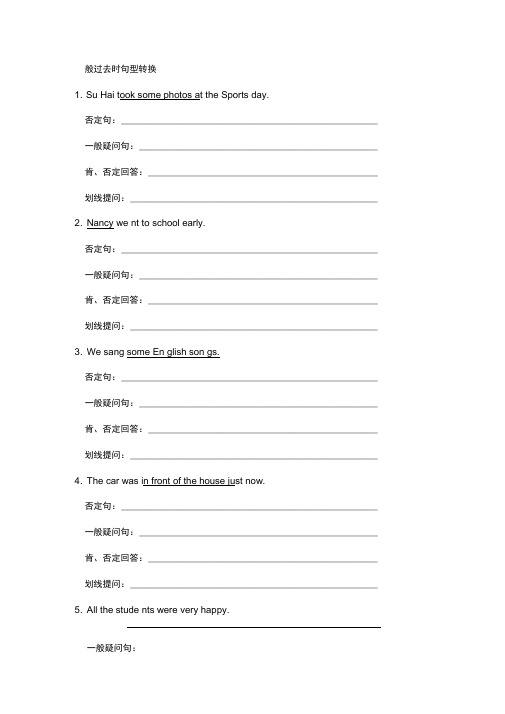
般过去时句型转换1. Su Hai took some photos at the Sports day.否定句:_________________________________________________________ 一般疑问句:_____________________________________________________ 肯、否定回答:___________________________________________________ 划线提问:_______________________________________________________ 2. Nancy we nt to school early.否定句:_________________________________________________________ 一般疑问句:_____________________________________________________ 肯、否定回答:___________________________________________________ 划线提问:_______________________________________________________ 3. We sang some En glish son gs.否定句:_________________________________________________________ 一般疑问句:_____________________________________________________ 肯、否定回答:___________________________________________________ 划线提问:_______________________________________________________ 4. The car was in front of the house just now.否定句:_________________________________________________________ 一般疑问句:_____________________________________________________ 肯、否定回答:___________________________________________________ 划线提问:_______________________________________________________ 5. All the stude nts were very happy.否定句:_________________________________________________________ 肯、否定回答: __________________________________________________ 6. They were in his pocket.否定句: ________________________________________________________ 一般疑问句: ____________________________________________________ 肯、否定回答: __________________________________________________ 划线提问: ______________________________________________________ 7. They played football in the playground.否定句: ________________________________________________________ 一般疑问句: ____________________________________________________ 肯、否定回答: __________________________________________________ 划线提问: ______________________________________________________ 8. He went out ten minu tes ago.否定句: ________________________________________________________ 一般疑问句: ____________________________________________________ 肯、否定回答: __________________________________________________ 划线提问: ______________________________________________________ 9. I bought a VCD last month.否定句: ________________________________________________________ 一般疑问句: ____________________________________________________ 肯、否定回答: __________________________________________________ 划线提问: ______________________________________________________10. The childre n had a good time in the park.否定句: ________________________________________________________划线提问: ______________________________________________________ 11. Ann did her homework yesterday eve ning.否定句: ________________________________________________________ 一般疑问句: ____________________________________________________ 肯、否定回答: __________________________________________________ 划线提问: ______________________________________________________ 12. Last week I read an En qlish book.否定句: ________________________________________________________ 一般疑问句: ____________________________________________________ 肯、否定回答: __________________________________________________ 划线提问: ______________________________________________________ 13. My brother was in the zoo just now.否定句: ________________________________________________________ 一般疑问句: ____________________________________________________ 肯、否定回答: __________________________________________________ 划线提问: ______________________________________________________ 14.She had some bread for lunch today.否定句: ________________________________________________________ 一般疑问句: ____________________________________________________ 肯、否定回答: __________________________________________________ 划线提问: ______________________________________________________ 15. There were some flowers in the garde n.肯、否定回答: __________________________________________________ 16. She could finish her homework by herself.否定句: ________________________________________________________ 一般疑问句: ____________________________________________________ 肯、否定回答: __________________________________________________ 17. They were good frie nd .否定句: ________________________________________________________ 一般疑问句: ____________________________________________________ 肯、否定回答: __________________________________________________ 划线提问: ______________________________________________________ 18. We saw a film with our teacher.否定句: ________________________________________________________ 一般疑问句: ____________________________________________________ 肯、否定回答: __________________________________________________ 划线提问: ______________________________________________________ 19. We listened to music the whole night .否定句: ________________________________________________________ 一般疑问句: ____________________________________________________ 肯、否定回答: __________________________________________________ 划线提问: ______________________________________________________ 20. She arrived there at 9:00 that day .否定句: ________________________________________________________。
外研版小学英语 一般过去时讲解

专注:心无旁骛,万事可破一般过去时一、结构:①be动词(is, am, are)→was/were 主语+ 谓语②实义动词→相应的动词过去式含义:①表示过去的事实或状态。
例:He was very busy an hour ago. 他在过去的一小时非常忙碌。
I was eight years old last year. 我去年8岁。
②表示在过去某个时间内所作的事情,常和表示过去的时间状语连用。
例:She bought many books yesterday. 昨天她买了很多书。
I played table tennis with my friend last Monday. 上周一我和一个朋友打了乒乓球。
表示过去的时间状语,有:yesterday, last week, last year, two days ago, ...二、动词的过去式动词有规则动词和不规则动词之分。
规则动词的过去式都是以-ed结尾,而不规则动词的过去式是没有规则。
1. 一般情况下,在动词原形后直接加ed。
如:wanted, played。
2. 以不发音的字母e结尾的动词,直接加d。
如:hoped, lived。
3. 重读闭音节单词需双写最后一个辅音字母,再加ed。
如:stopped, shipped。
4. 以辅音字母+y结尾的动词变y为i,再加ed。
如:studied,worried。
5. 有些动词不符合上面的规则,需要特殊记忆。
如:am(is)-was, are-were, go-went, eat-ate, swim-swam, buy-bought, see-saw, lose-lost teach-taught, bring-brought, think-thought, fall-fell, hurt-hurt, break-broke, win-won …1 / 1。
小学一般过去时
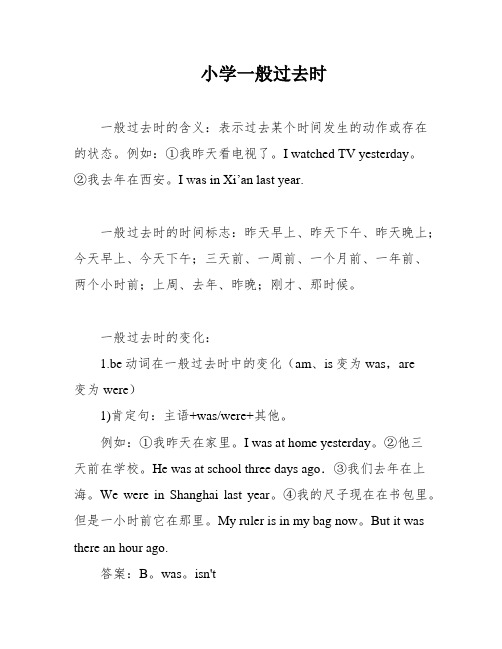
小学一般过去时一般过去时的含义:表示过去某个时间发生的动作或存在的状态。
例如:①我昨天看电视了。
I watched TV yesterday。
②我去年在西安。
I was in Xi’an last year.一般过去时的时间标志:昨天早上、昨天下午、昨天晚上;今天早上、今天下午;三天前、一周前、一个月前、一年前、两个小时前;上周、去年、昨晚;刚才、那时候。
一般过去时的变化:1.be动词在一般过去时中的变化(am、is变为was,are变为were)1)肯定句:主语+was/were+其他。
例如:①我昨天在家里。
I was at home yesterday。
②他三天前在学校。
He was at school three days ago.③我们去年在上海。
We were in Shanghai last year。
④我的尺子现在在书包里。
但是一小时前它在那里。
My ruler is in my bag now。
But it was there an hour ago.答案:B。
was。
isn't⑤我的笔十分钟前在桌子上。
但是现在它不在那里了。
My pen was on my desk ten minutes ago。
But it isn't there now.答案:A。
is。
wasn't2)否定句:主语+was/were+not+其他。
在was/were后加not,was not=wasn't;were not=weren't。
例如:①我昨天不在家里。
I wasn't at home yesterday。
②他三天前不在学校。
He wasn't at school three days ago.3.We were not in Shanghai last year。
(3) General ns: Did/ Were + subject + others。
一般现在时和一般过去时的句型转换
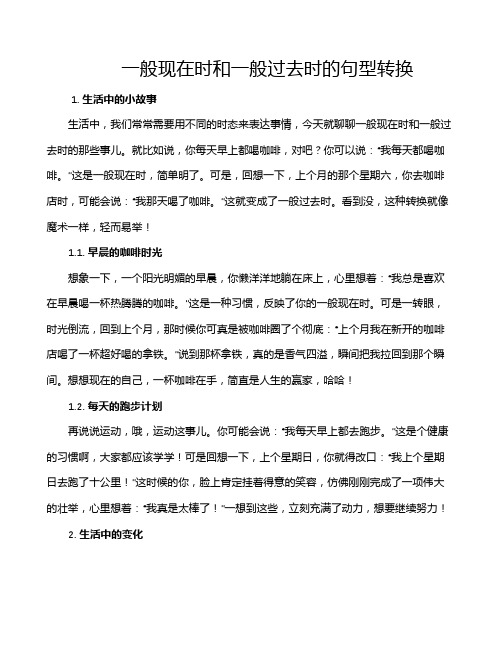
一般现在时和一般过去时的句型转换1. 生活中的小故事生活中,我们常常需要用不同的时态来表达事情,今天就聊聊一般现在时和一般过去时的那些事儿。
就比如说,你每天早上都喝咖啡,对吧?你可以说:“我每天都喝咖啡。
”这是一般现在时,简单明了。
可是,回想一下,上个月的那个星期六,你去咖啡店时,可能会说:“我那天喝了咖啡。
”这就变成了一般过去时。
看到没,这种转换就像魔术一样,轻而易举!1.1. 早晨的咖啡时光想象一下,一个阳光明媚的早晨,你懒洋洋地躺在床上,心里想着:“我总是喜欢在早晨喝一杯热腾腾的咖啡。
”这是一种习惯,反映了你的一般现在时。
可是一转眼,时光倒流,回到上个月,那时候你可真是被咖啡圈了个彻底:“上个月我在新开的咖啡店喝了一杯超好喝的拿铁。
”说到那杯拿铁,真的是香气四溢,瞬间把我拉回到那个瞬间。
想想现在的自己,一杯咖啡在手,简直是人生的赢家,哈哈!1.2. 每天的跑步计划再说说运动,哦,运动这事儿。
你可能会说:“我每天早上都去跑步。
”这是个健康的习惯啊,大家都应该学学!可是回想一下,上个星期日,你就得改口:“我上个星期日去跑了十公里!”这时候的你,脸上肯定挂着得意的笑容,仿佛刚刚完成了一项伟大的壮举,心里想着:“我真是太棒了!”一想到这些,立刻充满了动力,想要继续努力!2. 生活中的变化生活中,总是充满了变化。
现在的你也许正在学习新东西:“我现在正在学吉他。
”可是,想想去年,你可能会说:“去年我学了一整年的吉他。
”这种时态的变化就像一个时间的漩涡,把你带回到过去,又拉回现在。
这种对比,真是让人感慨万千。
2.1. 学习的乐趣想想现在,可能你在乐队里练习:“我现在和我的朋友们一起排练。
”可是,上个学期,你可得说:“上个学期我们常常一起排练。
”那种团结的气氛,真是让人怀念。
一起挥洒汗水,一起欢笑,生活中能有这样的伙伴,真是太幸福了。
学吉他不仅仅是技术上的提升,更是和朋友们一起享受音乐的乐趣!2.2. 饮食的变化再说到饮食习惯。
小学英语语法一般过去时的用法
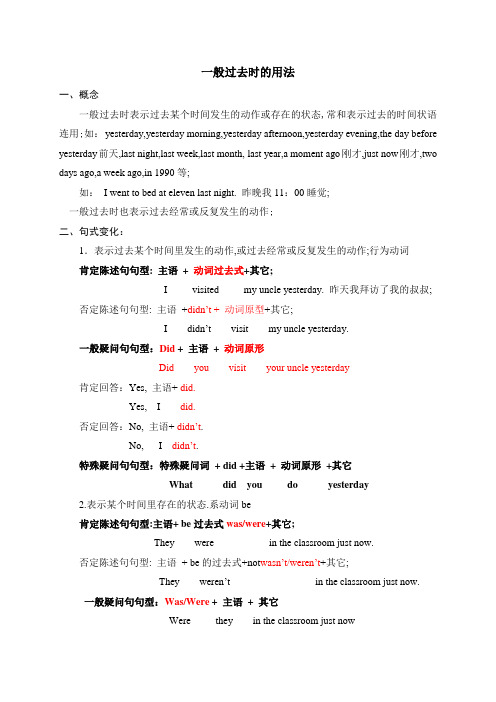
一般过去时的用法一、概念一般过去时表示过去某个时间发生的动作或存在的状态,常和表示过去的时间状语连用;如:yesterday,yesterday morning,yesterday afternoon,yesterday evening,the day before yesterday前天,last night,last week,last month, last year,a moment ago刚才,just now刚才,two days ago,a week ago,in 1990等;如:I went to bed at eleven last night. 昨晚我11:00睡觉;一般过去时也表示过去经常或反复发生的动作;二、句式变化:1.表示过去某个时间里发生的动作,或过去经常或反复发生的动作;行为动词肯定陈述句句型: 主语+ 动词过去式+其它;I visited my uncle yesterday. 昨天我拜访了我的叔叔;否定陈述句句型: 主语+didn’t + 动词原型+其它;I didn’t visit my uncle yesterday.一般疑问句句型:Did + 主语+ 动词原形Did you visit your uncle yesterday肯定回答:Yes, 主语+ did.Yes, I did.否定回答:No, 主语+ didn’t.No, I didn’t.特殊疑问句句型:特殊疑问词+ did +主语+ 动词原形+其它What did you do yesterday2.表示某个时间里存在的状态.系动词be肯定陈述句句型:主语+ be过去式was/were+其它;They were in the classroom just now.否定陈述句句型: 主语+ be的过去式+not wasn’t/weren’t+其它;They weren’t in the classroom just now.一般疑问句句型:Was/Were + 主语+ 其它Were they in the classroom just now肯定回答:Yes, 主语+ was/were.Yes, they were.否定回答:No, 主语+ wasn’t/weren’t.No, they weren’t.特殊疑问句句型:特殊疑问词+ was /were+主语+其它Where were they just now三、动词过去式的构成规律一规则动词的过去式1.以不发音e结尾的动词,在词尾直接加-d;live→lived use→used taste-tasted 2.以“辅音字母+ y”结尾的动词,先将y 改为i ,再加–ed;study→studied, tr y→tried fly→flied3.以重读闭音节即辅音+元音+辅音或r音节结尾,末尾只有一个辅音字母的动词,要先双写这个辅音字母后,再加–ed;stop→stopped ,plan→planned, prefer→preferred4.一般情况下,在动词原形后面加-ed;清辅音后读/t/,浊辅音和元音后读/d/. /t/ 和/d/后读/id/.look→looked play→played start→started visit→visited二不规则动词的过去式am/is---was are—were go-went swim—swam fly---flew do---did have---hadsay---said see---saw take---took come---came get---got draw---drew sing---sang read---read eat---ate tell---told sit---sat let---let cut---cut leave---left think---thought run---ran find---found wear---wore buy---bought write---wrote make---made一、用行为动词的适当形式填空1. He _____ live in Wuxi two years ago.2. The cat ____ eat a bird last night.3. We _____ have a party last Halloween. 5. I _____ make a model ship with Mike yesterday.4. Nancy _____ pick up oranges on the farm last week.6. They _____ play chess in the classroom last PE lesson.7. My mother ____ cook a nice food last Spring Festival.8. The girls _____ sing and _____ dance at the party.9. What _____ she ____ find in the garden last morning She ____ find a beautiful butterfly.10. ____ he ____ the flowers this morning Yes, he _____. water11. ____ you ____ visit your relatives last Spring Festival12. ____ he ____ fly a kite on Sunday Yes, he _____.二.用be动词的适当形式填空____ at school just now. 2.He ____ at the camp last week.____ students two years ago. 4.They ___ on the farm a moment ago.Ling ____eleven years old last year. 7.She _____ happy yesterday.___ an apple on the plate yesterday.8.There ___ some milk in the fridge on Sunday.9.The mobile phone __ on the sofa yesterday evening.10.They ____ glad to see each other last month.11.Today ____ the second of June. Yesterday ____ the first of June.It _____Childr en’s Day. All the students _____ very excited. 、三.用动词的适当形式填空1. It ____ be Ben’s birthday last Friday.2. We all _____ have a good time last night.3. He ____ jump high on last Sports Day.4. Helen ____ milk a cow on Friday.5. It ____ be the 2nd of November yesterday.6. She likes _____ newspapers, but she _____ a book yesterday. read7. He _____ football now, but they _____ basketball just now. play8. Jim’s mother _____ plant trees just now.9. ____ they ____ sweep the floor on Sunday No, they _____.10. I ____ watch a cartoon on Monday. 11. We _____ go to school on Sunday.四、用一般过去时填空1、I ____go to the cinema last Saturday. is ill yesterday.3、We ____ have a lesson yesterday.4、What ___your uncle ____do yesterday morning He _read English.5、She _____clean our classroom yesterday afternoon.五.句型转换played football in the playground.否定句:________________________________________________一般疑问句:____________________________________________肯、否定回答:__________________________________________2.It was exciting.否定句:__________________.一般疑问句:_________________. 肯、否定回答:_______________________________________.3. All the students were very excited.否定句:________________________________________________一般疑问句:____________________________________________ 肯、否定回答:__________________________________________ 4. They took many pictures in Beijing last Saturday.否定句:____________________________________________一般疑问句:____________________________________________ 肯、否定回答:__________________________________________ 5. There was a car in front of the house just now.否定句:________________________________________________一般疑问句:____________________________________________ 肯、否定回答:__________________________________________ 六、中译英、1.我的故事书刚才还在手表旁边;2. 你上周在哪儿在野营基地;_________________________________________________________ 3.一会以前花园里有两只小鸟;___________________________4. 格林先生去年住在中国;__________________________________5. 昨天我们参观了农场;__________________________________七、根据文答句写出问句;1、I did my homework yesterday. 3、八、用动词的适当形式填空1. I _____ watch a cartoon on Saturday.2. Her father ____ read a newspaper last night.3. We _____ to zoo yesterday, we ____ to the park. go4. Gao Shan _____ pull up carrots last National Day holiday.5. I _____ sweep the floor yesterday, but my mother _____.九、中译英1. 我们上周五看了一部电影;_________________________________________________________ 2. 他上个中秋节走亲访友了吗是的;_________________________________________________________ 3. 你们上个儿童节做了什么我们参观了动物园;_________________________________________________________ 4. 他的朋友在照看他的弟弟;_________________________________________________________ 5. 去年端午节我们没去看了龙舟比赛;_________________________________________________________ 6. 他在音乐课上拉小提琴了吗不,没有;_________________________________________________________十、用动词的适当形式填空1. It ____ be the 2nd of November yesterday.Mr White ____ go to his office by car.2. Gao Shan _____ put the book on his head a moment ago.3. Don’t _____ the house. Mum ____ it yesterday. clean4. What ____ you _____ just now I _____ some housework. do5. They _____ make a kite a week ago.6. I want to _____ apples. But my dad _____ all of them last month. pick7. She ____ be a pretty girl. Look, she ____ do Chinese dances.8. The students often ____ draw some pictures in the art room.____ Mike do on the farm He ____ cows. milk。
小学英语一般过去时专项讲解、练习和参考答案
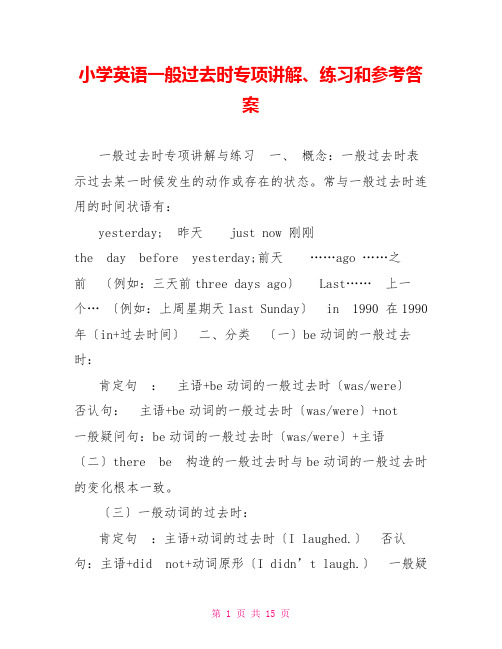
小学英语一般过去时专项讲解、练习和参考答案一般过去时专项讲解与练习一、概念:一般过去时表示过去某一时候发生的动作或存在的状态。
常与一般过去时连用的时间状语有:yesterday; 昨天 just now 刚刚the day before yesterday;前天……ago ……之前〔例如:三天前three days ago〕Last……上一个… 〔例如:上周星期天last Sunday〕 in 1990 在1990年〔in+过去时间〕二、分类〔一〕be动词的一般过去时:肯定句:主语+be动词的一般过去时〔was/were〕否认句:主语+be动词的一般过去时〔was/were〕+not 一般疑问句:be动词的一般过去时〔was/were〕+主语〔二〕there be 构造的一般过去时与be动词的一般过去时的变化根本一致。
〔三〕一般动词的过去时:肯定句:主语+动词的过去时〔I laughed.〕否认句:主语+did not+动词原形〔I didn’t laugh.〕一般疑问句:Did+主语+动词原形〔Did you laugh?〕三.巧记chant 动词一般过去时,表示过去发惹事;be用was或用were, have,has变had;谓语动词过去式,过去时间坐标志;一般动词加-ed,假设是特殊得硬记。
否认句很简单,主语之后didn’t添;疑问句也不难,did放在主语前;假如谓语之前有did,谓语动词需复原;动词假设是was,were,否认就把not添。
四、习题练习〔一〕用动词的适当形式填空:1. He ______(work) in that bank four years ago. 2.She ______ (live) in the US last Monday. 3.I ______ (see) him yesterday.4.He _______(e) to school at 6 o’clock this m orning.5. The boy _______(have) a bad cold yesterday. 6.When _______ you _______ (buy) that house? 7. He _______(tell) a story to his daughter yester day. 8. _____ you ____(try) to call me last night? 9.What _______you _______ (buy) in the shop? I ______ (buy) a coat just now. 10.The doctor ______ (get) up late this morning. 11. She ________ (paint) the wall last month. 12. My mother _______ (be) a worker 20 years ago.13. ________(be) you here just now? No, I ________(be not) here. 14.Why _______ your brother _______(cry) last night? 15. It______(be) my mother’s birthday yesterday. 〔二〕翻译以下句子:1.我上周去看爷爷和奶奶了。
小学英语一般过去时

英语一般过去时定义表示在的过去某个时间里所发生的动作或存在的状态。
构成一般过去时的句式变化1.陈述句:主语+动词过去式+其他I saw the rianbow yesterday.我昨天看到了彩虹。
They went to he park last Sunday.上周日他们去了公园。
Ben got up at six this morning.本今天早上是六点起床的。
2.一般疑问句1)将be动词提到句首陈述句:It was an egg yesterday.它昨天还是一个蛋。
一般疑问句:Was it an egg yesterday?它昨天还是一个蛋吗?陈述句:They were at school just now.他们刚才还在学校。
一般疑问句:Were they at school just now?他们刚才还在学校吗?Linda老师的小提醒主语是第一人称和第二人称的句子,其过去时变化时,要注意be动词的变化。
一般疑问句:Were you at home last night?你昨天晚上在家吗?肯定回答:Yes,I was.否定回答:No,I wasn't.2)用助动词did陈述句:I did my homework at school,我在学校做了作业。
一般疑问句:Did you do your homework at school?你在学校做作业了吗?陈述句:They played basketball just now.他们刚才打了篮球。
一般疑问句:Did they play basketball just now?他们刚才打篮球了吗?小提醒由过去时态的陈述句变一般疑问句时,变化技巧上可以用拆分法,将动词过去式拆分为did+动词原形,然后将did提到句首,这样就不容易发生错误。
He slept a whole day.他睡了一整天。
第一步:先将slept拆分为did sleep第二步:将did提到句首变成:Did he sleep a whole day?他睡了一整天吗?3.否定句1)在be动词后面+not陈述句:I was a teacher twenty years ago.我20年前是一名老师。
小学一般过去式句型转换
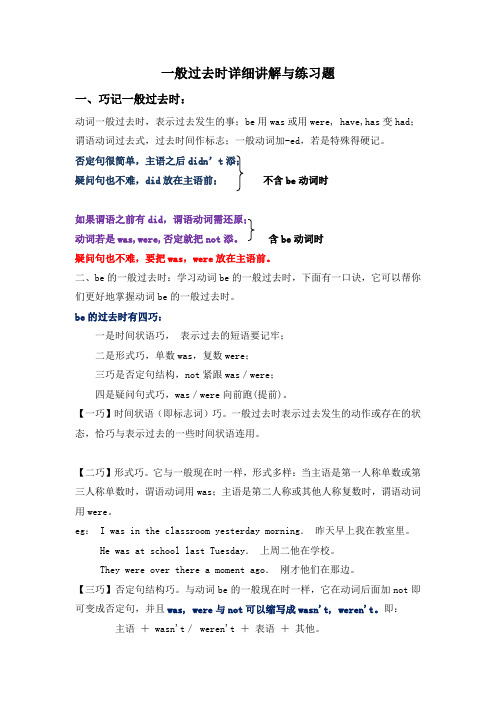
一般过去时详细讲解与练习题一、巧记一般过去时:动词一般过去时,表示过去发生的事;be用was或用were, have,has变had;谓语动词过去式,过去时间作标志;一般动词加-ed,若是特殊得硬记。
否定句很简单,主语之后didn’t添;疑问句也不难,did放在主语前;不含be动词时如果谓语之前有did,谓语动词需还原;动词若是was,were,否定就把not添。
含be动词时疑问句也不难,要把was,were放在主语前。
二、be的一般过去时:学习动词be的一般过去时,下面有一口诀,它可以帮你们更好地掌握动词be的一般过去时。
be的过去时有四巧:一是时间状语巧,表示过去的短语要记牢;二是形式巧,单数was,复数were;三巧是否定句结构,not紧跟was/were;四是疑问句式巧,was/were向前跑(提前)。
【一巧】时间状语(即标志词)巧。
一般过去时表示过去发生的动作或存在的状态,恰巧与表示过去的一些时间状语连用。
【二巧】形式巧。
它与一般现在时一样,形式多样:当主语是第一人称单数或第三人称单数时,谓语动词用was;主语是第二人称或其他人称复数时,谓语动词用were。
eg: I was in the classroom yesterday morning.昨天早上我在教室里。
He was at school last Tuesday.上周二他在学校。
They were over there a moment ago.刚才他们在那边。
【三巧】否定句结构巧。
与动词be的一般现在时一样,它在动词后面加not即可变成否定句,并且was, were与not可以缩写成wasn't, weren't。
即:主语+ wasn't/ weren't +表语+其他。
例如:I was not (=wasn't) here yesterday.昨天我不在这儿。
My parents were not (=weren't) at home last Sunday.上周日我父母不在家。
小学一般过去时练习题
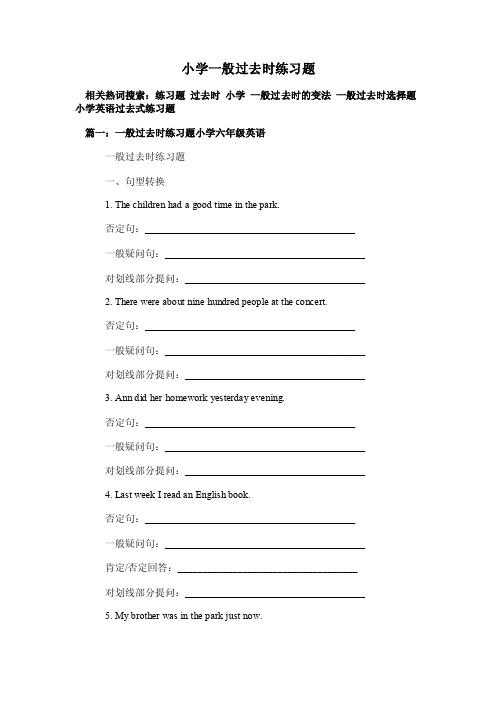
小学一般过去时练习题相关热词搜索:练习题过去时小学一般过去时的变法一般过去时选择题小学英语过去式练习题篇一:一般过去时练习题小学六年级英语一般过去时练习题一、句型转换1. The children had a good time in the park.否定句:__________________________________________一般疑问句:________________________________________对划线部分提问:____________________________________2. There were about nine hundred people at the concert.否定句:__________________________________________一般疑问句:________________________________________对划线部分提问:____________________________________3. Ann did her homework yesterday evening.否定句:__________________________________________一般疑问句:________________________________________对划线部分提问:____________________________________4. Last week I read an English book.否定句:__________________________________________一般疑问句:________________________________________肯定/否定回答:____________________________________对划线部分提问:____________________________________5. My brother was in the park just now.否定句:__________________________________________一般疑问句:________________________________________对划线部分提问:____________________________________二、写出下列动词的第三人称单数形式、过去式形式go _______ _______ enjoy _______ _______buy _______ _______ eat _______ _______get _______ _______ walk _______ _______take _______ _______ dance _______ _______write _______ _______ run _______ _______swim _______ _______ find _______ _______begin _______ _______ eat _______ _______play _______ _______ study _______ _______三、用所给词的适当形式填空。
小学英语一般过去时语法详解
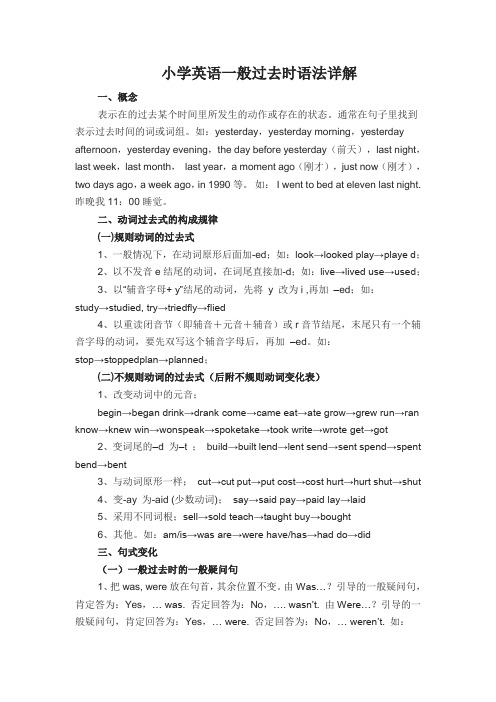
小学英语一般过去时语法详解一、概念表示在的过去某个时间里所发生的动作或存在的状态。
通常在句子里找到表示过去时间的词或词组。
如:yesterday,yesterday morning,yesterday afternoon,yesterday evening,the day before yesterday(前天),last night,last week,last month,last year,a moment ago(刚才),just now(刚才),two days ago,a week ago,in 1990等。
如:I went to bed at eleven last night.昨晚我11:00睡觉。
二、动词过去式的构成规律(一)规则动词的过去式1、一般情况下,在动词原形后面加-ed;如:look→looked play→playe d;2、以不发音e结尾的动词,在词尾直接加-d;如:live→lived use→used;3、以“辅音字母+ y”结尾的动词,先将y 改为i ,再加–ed;如:study→studied, try→triedfly→flied4、以重读闭音节(即辅音+元音+辅音)或r音节结尾,末尾只有一个辅音字母的动词,要先双写这个辅音字母后,再加–ed。
如:stop→stoppedplan→planned;(二)不规则动词的过去式(后附不规则动词变化表)1、改变动词中的元音;begin→began drink→drank come→came eat→ate grow→grew run→ran know→knew win→wonspeak→spoketake→took write→wrote get→got2、变词尾的–d 为–t ;bu ild→built lend→lent send→sent spend→spent bend→bent3、与动词原形一样;cut→cut put→put cost→cost hurt→hurt shut→shut4、变-ay 为-aid (少数动词);say→said pay→paid lay→laid5、采用不同词根;sell→sold teach→taught buy→bought6、其他。
- 1、下载文档前请自行甄别文档内容的完整性,平台不提供额外的编辑、内容补充、找答案等附加服务。
- 2、"仅部分预览"的文档,不可在线预览部分如存在完整性等问题,可反馈申请退款(可完整预览的文档不适用该条件!)。
- 3、如文档侵犯您的权益,请联系客服反馈,我们会尽快为您处理(人工客服工作时间:9:00-18:30)。
一般过去时详细讲解与练习题一、巧记一般过去时:动词一般过去时,表示过去发生的事;be用was或用were, have,has变had;谓语动词过去式,过去时间作标志;一般动词加-ed,若是特殊得硬记。
否定句很简单,主语之后didn’t添;疑问句也不难,did放在主语前;不含be动词时如果谓语之前有did,谓语动词需还原;动词若是was,were,否定就把not添。
含be动词时疑问句也不难,要把was,were放在主语前。
二、be的一般过去时:学习动词be的一般过去时,下面有一口诀,它可以帮你们更好地掌握动词be的一般过去时。
be的过去时有四巧:一是时间状语巧,表示过去的短语要记牢;二是形式巧,单数was,复数were;三巧是否定句结构,not紧跟was/were;四是疑问句式巧,was/were向前跑(提前)。
【一巧】时间状语(即标志词)巧。
一般过去时表示过去发生的动作或存在的状态,恰巧与表示过去的一些时间状语连用。
【二巧】形式巧。
它与一般现在时一样,形式多样:当主语是第一人称单数或第三人称单数时,谓语动词用was;主语是第二人称或其他人称复数时,谓语动词用were。
eg:I was in the classroom yesterday morning.昨天早上我在教室里。
He was at school last Tuesday.上周二他在学校。
They were over there a moment ago.刚才他们在那边。
【三巧】否定句结构巧。
与动词be的一般现在时一样,它在动词后面加not即可变成否定句,并且was, were与not可以缩写成wasn't, weren't。
即:主语+wasn't/weren't +表语+其他。
例如:I was not (=wasn't) here yesterday.昨天我不在这儿。
My parents were not (=weren't) at home last Sunday.上周日我父母不在家。
【四巧】疑问句式巧。
把was, were提到句首,句末用问号即可变为一般疑问句。
即:Was(Were) +主语+表语+其他?这恰巧与动词be的一般现在时的疑问句式相似。
例如:Were you at home the day before yesterday﹖前天你在家吗?Was she late this morning﹖今天早上她迟到了吗?更巧的是疑问句的答语也相似,肯定回答用“Yes, 主语+was/were.”;否定回答用“No,主语+wasn't/weren't.”。
eg:—Were Wei Hua and Han Mei here just now﹖刚才魏华和韩梅在这儿吗?—Yes, they were.(No, they weren't.) 是的,她们在。
(不,她们不在。
)动词过去式变化规则:1.一般在动词末尾加-ed,如:pull-pulled, cook-cooked2.结尾是e加d,如:taste-tasted3.末尾只有一个元音字母和一个辅音字母的重读闭音节,应双写末尾的辅音字母,再加-ed,如:stop-stopped4.以“辅音字母+y”结尾的,变y为i,再加-ed,如:study-studied5.不规则动词过去式:am,is-was are-were do-did see-saw say-said give-gave get-got go-went come-came have-had eat-ate take-took run-ran sing-sang put-put make-made read-read write-wrote draw-drew drink-drank fly-flew ride-rode speak-spoke sweep-swept swim-swam sit-sat一、句型转换1. The children had a good time in the park.否定句:__________________________________________ 一般疑问句:__________________________________________ 对划线部分提问:__________________________________________ 2. There were about nine hundred people at the concert.(音乐会)否定句:__________________________________________ 一般疑问句:__________________________________________对划线部分提问:__________________________________________ 3. Ann did her homework yesterday evening.否定句:__________________________________________ 一般疑问句:__________________________________________ 对划线部分提问:__________________________________________ 4. Last week I read an English book.否定句:__________________________________________ 一般疑问句:___________________________________________ 肯定/否定回答:__________________________________________ 对划线部分提问:__________________________________________ 5. My brother was in the park just now.否定句:__________________________________________ 一般疑问句:__________________________________________ 肯定/否定回答:___________________________________________ 对划线部分提问:____________________________________6. She had some bread for lunch yesterday.否定句:__________________________________________一般疑问句:________________________________________肯定/否定回答:____________________________________对划线部分提问:____________________________________*7. They read English last night.否定句:__________________________________________一般疑问句:________________________________________肯定/否定回答:____________________________________对划线部分提问:____________________________________ 8. I was born in 2007.否定句:_____________________________________________一般疑问句:_________________________________________对划线部分提问:_____________________________________二、写出下列动词的过去式Is_______ are ________have _________want _______hear________ Sit_______ watch _______play ______ enjoy _______do________ study ______dance _______like_______ live ________go ______ buy ______ eat______ get _______ walk ______take______put _______run______ come_______ become________ fly________ swim_______ find _______ begin______三、请用正确动词形式填空。
1. I _________ (have) an exciting party last weekend.2. _________ she _________(practice) her guitar yesterday?No, she _________.3. What ________ Tom ________ (do) on Saturday evening?He ________(watch) TV and __________(read) an interesting book.4. They all _________(go) to the mountains yesterday morning.5. She _________(not visit) her aunt last weekend.She ________ (stay) at home and _________(do) some cleaning.6. When ________ you _________(write) this song? I __________(write) it last year.7. My friend, Carol, ________(study) for the math test and ________(practice) English last night.8. ________ Mr. Li __________(do) the project on Monday morning? Yes, he _________.9. How _________(be) Jim's weekend? It _________(be not) bad.10. ________ (be) your mother a sales assistant last year? No. she __________.四、改错题.1.How is Jane yesterday? _____________________2.He go to school by bus last week. ____________________________ 3.He often goes home at 6:00 last month. _______________________ 4.I can fly kites seven years ago. ______________________________ 5.Did you saw him just now?__________________________________ 6.Tom wasn’t watch TV last night. ______________________________ 7.I didn’t my homework yesterday. _____________________________ 8.He wait for you three hours ago. ______________________________本文档部分内容来源于网络,如有内容侵权请告知删除,感谢您的配合!。
